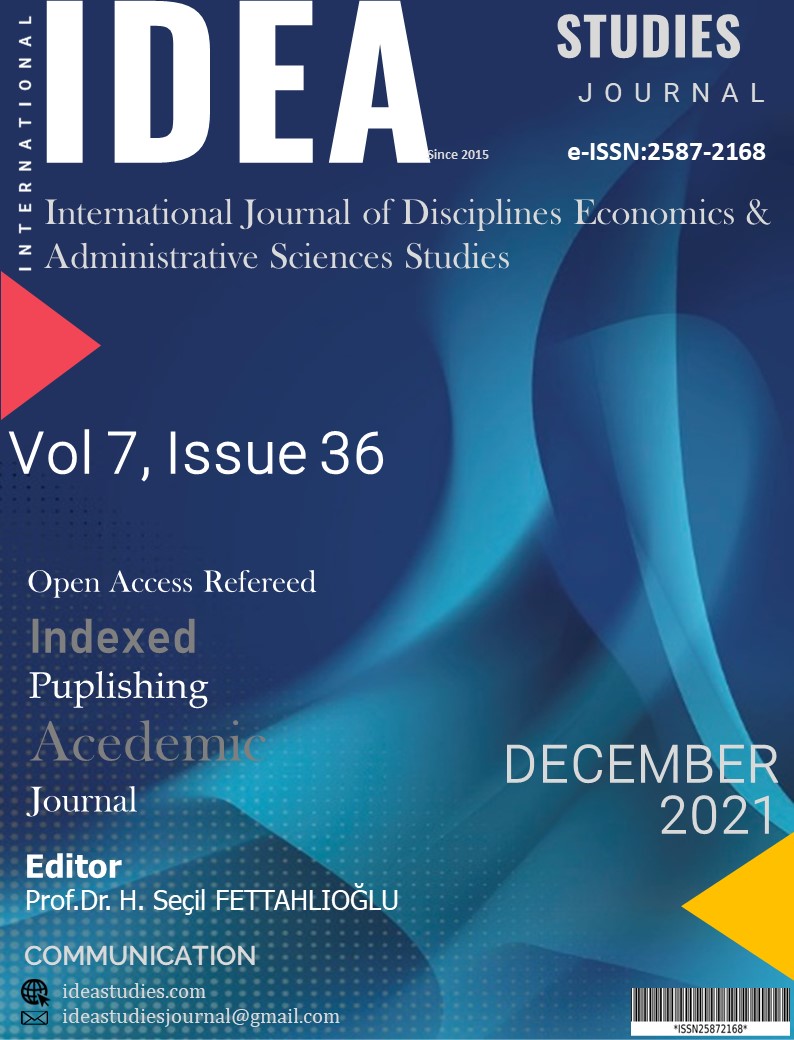Author :
Abstract
Bu çalışmada kurumlarda iç denetim biriminin başarısı için tanımlanan her bir kriterin önem düzeyi belirlenmeye çalışılmıştır. Çalışmanın birinci aşamasında, iç denetim biriminin başarısı için gerekli olan 5 kriter bir literatür taraması uygulanarak belirlendi. Literatür taramasının ardından, her bir kriterin önem düzeyini elde etmek için bir anket hazırlandı. Anket İstanbul ve Kocaeli’deki 13 iç denetçiye uygulandı. Anket ile veri toplandıktan sonra, veri SWARA yöntemi ile analiz edildi. SWARA yöntemi her bir kriterin önem düzeyini belirlemeyi sağladı. SWARA yönteminin analiz sonuçlarına göre, kurum kültürü ve üst yönetimin iç denetime desteği, kurumlarda iç denetim biriminin başarısı için en önemli kriterler olarak bulundu. Sonuçlar ayrıca, kurum içindeki her bir iç denetçi iç denetim görevlerini etkin bir şekilde yerine getirecek yeterli yeteneğe sahip olsa bile, iç denetim başarısının üst yönetimin desteği olmadan mümkün olmadığını gösterdi.
Keywords
Abstract
In this study, it was aimed to determine the importance level of each criteria defined for internal audit unit’s success in organizations. In the first step of the study, 5 criteria that are required for internal audit unit’s success were determined by applying a literature review. Following the literature review, a questionnaire was prepared to obtain the importance level of each criteria. The questionnaire was applied to the 13 internal auditors in İstanbul and Kocaeli. After collecting the data through questionnaire, the data was analyzed by using SWARA method. SWARA method provided to determine the importance level of each criteria. According to the analysis results of SWARA method, organizational culture and top management support to internal audit were found as the most important criteria for internal audit unit’s success in organizations. The results also denoted that internal audit success is not possible without the support of top management, even if each of the internal auditors inside the organization have enough skill to carry out the internal audit tasks effectively.
Keywords
- Alptürk, E. (2008). Muhasebe ve Vergi Boyutlarında İç Denetim Rehberi. Ankara: Maliye ve Hukuk
- Alptürk, E. (2008). Muhasebe ve Vergi Boyutlarında İç Denetim Rehberi. Ankara: Maliye ve Hukuk Yayınları.
- Aslan, B. (2010). Bir Yönetim Fonksiyonu Olarak İç Denetim. Sayıştay Dergisi, 77, 63-86.
- Baloğlu, G. (2019). İç Denetim İçin Çeviklik: Türk Finans Sektöründeki Bir İşletme Üzerinde İnceleme. Muhasebe Enstitüsü Dergisi, 60, 37-46.
- Çalış, Y. E. (2013). Aracı Kurumlarda İç Denetim Uygulaması. İstanbul: Yalın Yayıncılık.
- Gökalp, B. (2013). Kamu Yönetiminde İç Denetim Etkinliğinin Ölçülmesi. (Yayımlanmamış Yüksek Lisans Tezi). Gazi Üniversitesi Sosyal Bilimler Enstitüsü, Ankara.
- Haftacı, V. (2011). Muhasebe Denetimi. Kocaeli: Umuttepe Yayınları.
- Hailemariam, S. (2014). Determinants of Internal Audit Effectiveness in The Public Sector, Case Study in Selected Ethiopian Public Sector Offices. (Doctoral Dissertation). Jimma University, Jimma.
- İstanbul Serbest Muhasebeci Mali Müşavirler Odası. (2013). Kobi’lerde İç Denetim İçin Pratik Bilgiler. Erişim: http://archive.ismmmo.org.tr/docs/YAYINLAR/kitaplar/ic%20denetim.pdf ( 03.04.2021).
- Kartal, F. (2013). Türkiye’de Kamu ve Özel Sektörde İç Denetim Uygulamaları. Maliye ve Finans Yazıları Dergisi, 1(99), 8-36.
- Kaya, B. (2015). Kurumsal Performansı Artırmak İçin İç Denetim, İç Kontrol ve Risk Yönetimi. Ankara: YaklaşımYayıncılık.
- Kepekçi, C. (1982). İşletmelerde İç Kontrol Sisteminin Etkinliğini Sağlamada İç Denetimin Rolü. Eskişehir: Eskişehir İktisadi ve Ticari İlimler Akademisi Yayınları.
- Keršuliene, V., Zavadskas, E.K. ve Turskis, Z. (2010). Selection of rational dispute resolution method byapplying new stepwise weight assessment ratio analysis (SWARA). Journal of Business Economics and Management, 11(2), 243-258.
- Kızılboğa, R. ve Özşahin, F. (2013). Etkin Bir İç Kontrol Sisteminin İç Denetim Faaliyetine ve İç Denetçilere Katkısı. Niğde Üniversitesi İktisadi ve İdari Bilimler Fakültesi Dergisi, 6(2), 220-236.
- Özeren, B. (2000). İç Denetim, Standartları ve Mesleğin Yeni Açılımları. Sayıştay Yayınları.
- Rudhani, L. H., Vokshi, N. B. ve Hashani, S. (2017). Factors Contributing to The Effectiveness of InternalAudit: Case Study of Internal Audit in The Public Sector in Kosovo. Journal of Accounting, Finance and Auditing Studies, 3(4), 91-108.
- Sarens, G. ve De Beelde, I. (2006). Internal auditors’ perception about their role in risk management. A comparison between US ve Belgian companies. Managerial Auditing Journal, 21(1) , 63-80.
- Soylu, H. (2010). İç Denetimin Yeni Bir Yaklaşım Olarak Kamu Sektöründe Uygulanması ve MevcutUygulamaların Verimlilik ve Başarısı: Türkiye Örneği. (Yayımlanmamış Yüksek Lisans Tezi). Karamanoğlu Mehmet Bey Üniversitesi Sosyal Bilimler Enstitüsü, Karaman.
- Toroslu, M.V. ( 2014). Türk Ticaret Kanunu Kapsamında İç Kontrol ve İç Denetim. İstanbul: Vedat Kitapçılık.
- Türedi, H., Karakaya, G., İldem, M. (2015). Kurumsal yönetim ve iç denetim ilişkisi. Sayıştay Dergisi, 96, 55-74.
- Zolfani, S. H. ve Banihashemi, S. S. A. (2014). Personnel selection based on a novel model of game theoryand MCDM approaches. In Proceedings of 8th International Scientific Conference Business and Management (pp.191-198). Vilnius, Lithuania.
- Zolfani, S.H. ve Saparauskas, J. (2013). New application of SWARA method in Prioritizing sustainability assessment indicators of energy system. Engineering Economics, 24(5), 408-414.





